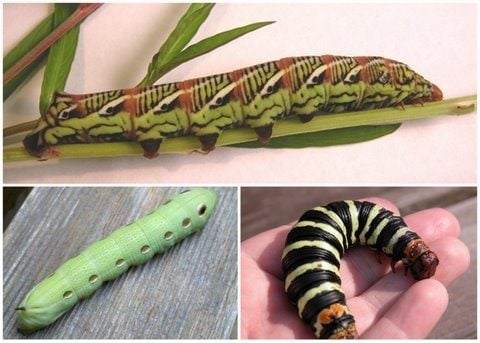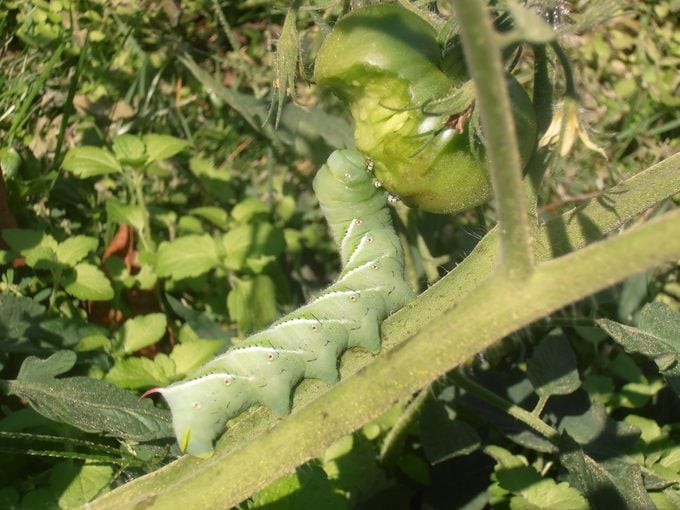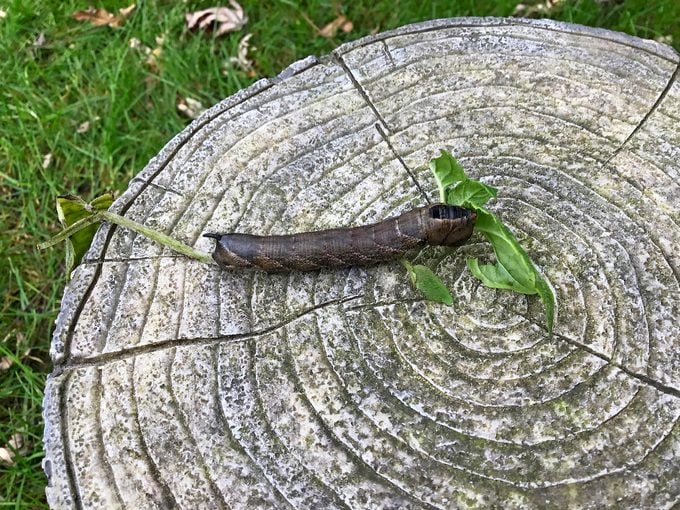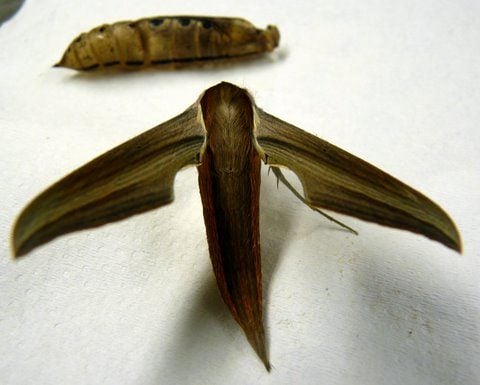See What a Sphinx Moth Caterpillar and Pupa Looks Like
Updated: May 22, 2024
Here's how to identify sphinx moth caterpillars and sphinx moth pupa in your garden. Learn what to look for in the stages of the sphinx moth life cycle.

No matter how gorgeous the adults, sphinx moth larvae evoke a “Yuck!” from many folks, although not from birds, which eagerly devour them. When full-grown, sphinx moth caterpillars are about the size of your little finger and are smooth with a pointy horn at the tail end.
It’s normal to overlook the unseemly larvae entirely unless one crosses your path as it goes off to pupate in late summer or early fall. Or you may only notice its presence when you see your tomato leaves devoured by a hungry sphinx moth caterpillar.
Meet the silk moths that might be in your backyard.
On This Page
Five-spotted Hawk Moth Caterpillar

Sphinx moth caterpillars often startle gardeners from their sheer size, often 4 to 5 inches in length and vividly-colored. Depending on the species, you’ll find them eating just about any kind of vegetation—including tomatoes. Yup, the dreaded tomato hornworm caterpillar is actually the larva of a sphinx moth.
Five-spotted hawk moth caterpillars, also known as tomato hornworms, are driven by voracious appetites to feast on tomato, tobacco and potato plants. Due to their size, these caterpillars can do a lot of damage, and gardeners sometimes view them as serious pests. To control tomato hornworms, pluck them off of your plants by hand.
Hermit Sphinx Moth Caterpillar

“What’s this caterpillar going to turn into?” asks Birds & Blooms reader Carla Sherack of Altura, Minnesota.
Birding and wildlife experts Kenn and Kimberly Kaufman say, “The large size and the little “horn” at the tail end are hints that this is one of the sphinx moths, also called hummingbird moths. This one is a hermit sphinx (Lintneria eremitus), known by the large black spot on the top of its head.
The species is widespread in southern Canada and the eastern United States, and its larvae feed on leaves of basil, sage and other members of the mint family. The adult hermit sphinx moths have gray-brown wings with wavy lines, and you might see them hovering around flowers in the evening.”
Tersa Sphinx Moth Caterpillar

“What kind of caterpillar is this? When I first saw it, it had an ‘elephant trunk’ appendage sticking out, which retracted when it saw me,” asks reader Dawn Bavuso of Ocklawaha, Florida.
Kenn and Kimberly say, “This is the larva of a hummingbird moth called tersa sphinx. In your photo, what looks like a head with two big eyes is really the larva’s fourth body segment. The first three body segments and the head are much narrower, and when they stretch out in front, they do appear like trunks.
When the larva is disturbed, it quickly retracts those front sections. In this posture, its front end resembles a snake’s head, which might repel some predators. The tersa sphinx is widespread in the southeastern states, and its larvae feed on pentas, firebush and other plants.”
Sphinx Moth Pupa
If you’re a gardener, chances are you may have come across a sphinx moth pupa at some point while digging in the dirt.
A sphinx moth pupa is quite big, several inches long and thicker than your thumb. The segmented end tends to wiggle when you touch it. The “handle” on the right side is actually a sheath protecting the developing proboscis—that certainly gives you an idea of the size of the moth that will emerge.

This tersa sphinx moth (above) is newly-emerged from its pupa casing, which you can see on the table behind it. Tersas are night-flyers, feeding on nectar.
Next, learn how to identify a hummingbird clearwing moth.
About the Experts
Kenn and Kimberly Kaufman are the official birding experts for Birds & Blooms. They are the creators of the Kaufman Field Guide series and they speak and lead birding trips all over the world.
Why Trust Us
For nearly 30 years, Birds & Blooms, a Trusted Media Brand, has been inspiring readers to have a lifelong love of birding, gardening and nature. We are the #1 bird and garden magazine in North America and a trusted online resource for over 15 million outdoor enthusiasts annually. Our library of thousands of informative articles and how-tos has been written by trusted journalists and fact-checked by bird and garden experts for accuracy. In addition to our staff of experienced gardeners and bird-watchers, we hire individuals who have years of education and hands-on experience with birding, bird feeding, gardening, butterflies, bugs and more. Learn more about Birds & Blooms, our field editor program, and our submission guidelines.





















